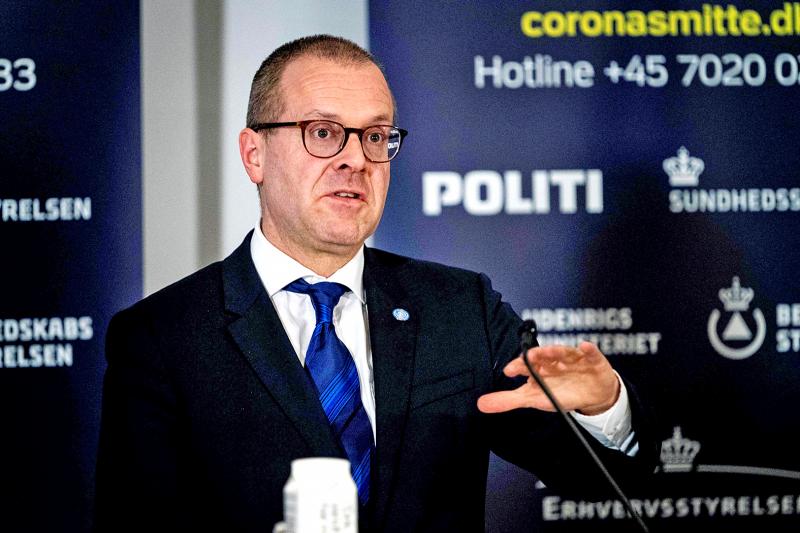The Omicron variant of SARS-CoV-2 has moved the COVID-19 pandemic into a new phase and could bring it to an end in Europe, WHO Regional Director for Europe Hans Kluge said on Sunday.
“It’s plausible that the region is moving toward a kind of pandemic endgame,” Hans Kluge said in an interview, adding that Omicron could infect 60 percent of Europeans by March.
Once the current surge of Omicron sweeping across Europe subsides, “there will be for quite some weeks and months a global immunity, either thanks to the vaccine or because people have immunity due to the infection, and also lowering seasonality,” Kluge said.

Photo: AFP
“We anticipate that there will be a period of quiet before COVID-19 may come back toward the end of the year, but not necessarily the pandemic coming back,” he said.
US National Institute of Allergy and Infectious Diseases Director Anthony Fauci expressed similar optimism on Sunday, telling ABC News talk show This Week that with COVID-19 cases declining “rather sharply” in parts of the US, “things are looking good.”
While cautioning against overconfidence, he said that if the fall in case numbers in areas such as the US’ northeast continued, “I believe that you will start to see a turnaround throughout the entire country.”
Last week, the WHO Regional Office for Africa also said that cases of COVID-19 had plummeted in that region and deaths were declining for the first time since the Omicron-dominated fourth wave of the virus reached its peak.
Omicron is the dominant variant in the EU and the European Economic Area, or Norway, Iceland and Liechtenstein, the European Centre for Disease Control and Prevention said last week.
Because of the very fast spread of the variant across Europe, Kluge said that emphasis ought to be on “minimising disruption of hospitals, schools and the economy, and putting huge efforts on protecting the vulnerable,” rather than measures to stop transmission.
However, he urged people to exercise personal responsibility.
“If you don’t feel well, stay home, take a self-test. If you’re positive, isolate,” he said.
Kluge said that the priority is to stabilize the situation in Europe, where vaccination levels range across countries from 25 to 95 percent of the population, leading to varying degrees of strain on hospitals and healthcare systems.
“Stabilizing means that the health system is no longer overwhelmed ... and can continue with the essential health services,” he said.

A car bomb killed a senior Russian general in southern Moscow yesterday morning, the latest high-profile army figure to be blown up in a blast that came just hours after Russian and Ukrainian delegates held separate talks in Miami on a plan to end the war. Kyiv has not commented on the incident, but Russian investigators said they were probing whether the blast was “linked” to “Ukrainian special forces.” The attack was similar to other assassinations of generals and pro-war figures that have either been claimed, or are widely believed to have been orchestrated, by Ukraine. Russian Lieutenant General Fanil Sarvarov, 56, head

SAFETY FIRST: Double the number of police were deployed at the Taipei Marathon, while other cities released plans to bolster public event safety Authorities across Taiwan have stepped up security measures ahead of Christmas and New Year events, following a knife and smoke bomb attack in Taipei on Friday that left four people dead and 11 injured. In a bid to prevent potential copycat incidents, police deployments have been expanded for large gatherings, transport hubs, and other crowded public spaces, according to official statements from police and city authorities. Taipei Mayor Chiang Wan-an (蔣萬安) said the city has “comprehensively raised security readiness” in crowded areas, increased police deployments with armed officers, and intensified patrols during weekends and nighttime hours. For large-scale events, security checkpoints and explosives

PUBLIC SAFETY: The premier said that security would be tightened in transport hubs, while President Lai commended the public for their bravery The government is to deploy more police, including rapid response units, in crowded public areas to ensure a swift response to any threats, President William Lai (賴清德) said yesterday after a knife attack killed three people and injured 11 in Taipei the previous day. Lai made the remarks following a briefing by the National Police Agency on the progress of the investigation, saying that the attack underscored the importance of cooperation in public security between the central and local governments. The attack unfolded in the early evening on Friday around Taipei Main Station’s M7 exit and later near the Taipei MRT’s Zhongshan

REBUFFED: In response to Chinese criticism over recent arms sales, Washington urged Beijing to engage in meaningful dialogue instead of threats and intimidation Washington’s long-term commitment to Taiwan would not change, the US Department of State said yesterday, urging Beijing to stop pressuring Taiwan and engage in meaningful bilateral dialogues. The remarks came in response to a backlash from Beijing about Washington’s latest approval of arms sales to Taiwan. The US Defense Security Cooperation Agency said in a statement on Wednesday that the Taipei Economic and Cultural Representative Office in the US has asked to purchase an arms package, including Tactical Mission Network Software; AH-1W helicopter spare and repair parts; M109A7 self-propelled howitzers; HIMARS long range precision strike systems; tube-launched, optically tracked, wire-guided missiles; Javelin